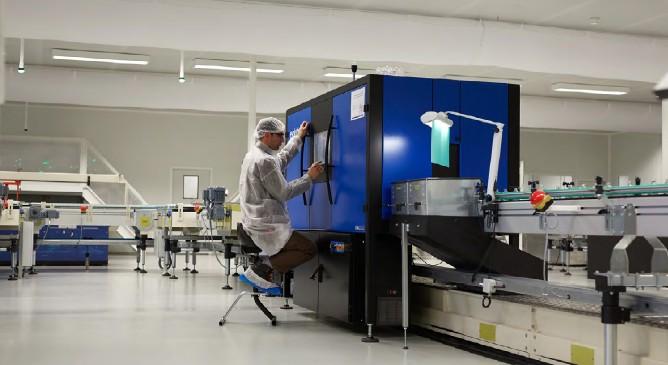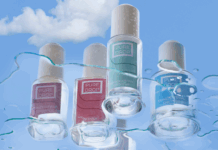Iris Inspection machines, a subsidiary of the Wisetec Group, is celebrating its 20th anniversary this year. Specializing in the design and production of inspection robots for detecting glass defects, it has established itself over the years as one of the spearheads of the glass packaging vision inspection industry worldwide. Buoyed by its sound economic health, thanks to massive investment in R&D and a diversified customer base on all five continents, IRIS Inspection Machines aims to increase its sales and workforce by 50% within the next three years.
In 20 years, Iris Inspection machines has become the European leader in vision inspection solutions for mass-produced glass containers of all shapes and colors.
After ten years working for the glass group BSN, later to become Danone, where they met - the group was then headed by Antoine Riboud - Jean-Luc Logel and Philippe Volay bought Centralp, a specialist in embedded electronic systems, in 2000. They saw technological developments, such as the use of rugged PCs in industrial environments and matrix cameras, as opening up new opportunities in glass production. By investing heavily in innovation, the company positioned itself as a pioneer from the outset, launching the innovative concept of 16 cameras, compared with the 6 available on the inspection machine market at the time.
" This innovation was the company's first milestone. This 16-camera leé system offers 12 angles of view, with 2 cameras positioned on the same vertical axis, enabling two shots to be taken simultaneously. We were able to double the resolution of the complete view of the bottle, multiply the angles of observation and be twice as precise in the inspection. "explains Jean-Luc Logel, President of Iris Inspection machines.
Innovation: an integral part of the company's DNA
In 2014, the company continued to distinguish itself by its capacity for innovation and the quality of its R&D teams with the introduction of high-definition cameras. By increasing image resolution and consequently accuracy in defect recognition, IRIS continues its ascent in the glass packaging inspection sector in Europe and worldwide.
In 2018, with the launch of the Evolution Neo range, lris Inspection machines became the European leader in the sector.
The implementation of artificial intelligence in this new range of machines represents a new digital frontier, revolutionizing glass defect recognition. Based on machine learning techniques, the machine learns to recognize and classify defects with the precision of an experienced glassmaker's eye, and the repeatability of computer processing power.
Artificial intelligence as a new Eldorado for Iris
With the advent of Industry 4.0, IRIS Inspection machines has positioned itself as at the forefront of technology. Having become a pillar of this digital revolution, the company is now focusing on artificial intelligence with the ambition of going even further.
While riA is capable of significantly improving inspection, it is no substitute for glass experts. Glass is a unique material, and the knowledge and experience of glassmakers in its production is essential if the manufacturing process is to be optimized.
The new challenge for the Irls team: to combine the power of their iA solution with glassmaking know-how.
" Innovation has always been our guiding principle. We have given ourselves the means to
become a forerunner and an ambitious benchmark player in industry 4.0
with artificial intelligence and its ability to improve productivity. Proof of this is the 17% of expenditure in the R&D department in 2021. "explains Jean-Luc Logel.
Today, an average of 5 to 10% of glass production in a glassworks is destined for scrap. With artificial intelligence, Iris' leitmotiv is to work closely with glassmakers to achieve the goal of "zero defects".
A full order book and strong ambitions for the next three years
Thanks to the glass industry's drive to reduce its carbon footprint and strong demand for glassmaking capacity in Europe (3 to 5 million tonnes unique to Germany, Italy and France, compared with 4 million tonnes for the USA and Canada combined), production will continue to grow in the months and years ahead.
" We don't produce enough glass for European demand. At Iris, we have an order book that allows us to look to the future with confidence, thanks to the technological shift we've made. In 2021, we will have sold no less than 150 machines, and we have an opening on the international market, notably in Turkey and Mexico, which indicates that we will exceed this figure. I'm optimistic about the future of the company and the sector. "concludes Jean-Luc Logel.
This optimism is reflected in the company's workforce projections. With nearly 20 million euros in sales by 2022, Iris is counting on sales growth of 50 % over the next three years. The same applies to employees: with 45 at present, it aims to increase its workforce to 50 %. The company is also expanding in the service sector, where more than half the workforce is mobilized to serve customers. To be as close as possible to its customers through their expertise and to be a forerunner in innovation - this is the raison d'être that has led Iris to international success and to look to the future with serenity and ambition.








